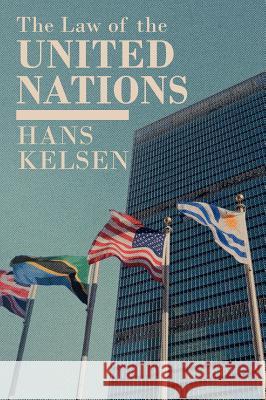The Law of the United Nations. A Critical Analysis of Its Fundamental Problems » książka
The Law of the United Nations. A Critical Analysis of Its Fundamental Problems
ISBN-13: 9781584770770 / Angielski / Twarda / 2011 / 1014 str.
First published under the auspices of The London Institute of World Affairs in 1950. With a supplement, Recent Trends in the Law of the United Nations 1951]. " A] number of reasons why this book is bound to appeal to delegates as a source of quotation. One such reason obviously is the international reputation of its author, particularly his prestige in European and Latin American countries. Another is the comprehensive and systematic character of the book, which covers almost all of the basic legal problems presented by the Charter. Most important, perhaps, is the fact that delegates - and other readers - are likely to be impressed with the fundamental approach of the book: its close analysis of the structure of rules and their inter-relationships; the eschewing of political and ideological considerations; the emphasis on legal duties rather than purpose and functions; the awareness of the creative role played by the law-applying organs. These guiding principles (which are derived from, though not logically dependent on, Kelsen's pure theory) are welcome elements in a study of this kind; they promise objectivity, toughmindedness and technical skill, attributes which in a legal treatise will command more respect than idealism or imagination. For these reasons, the book may exert a significant influence of developments in the United Nations." --Oscar Schachter, 60 Yale Law Journal 1951, 189-190. Possibly the most influential jurisprudent of the twentieth century, HANS KELSEN 1881-1973] was legal adviser to Austria's last emperor and its first republican government, the founder and permanent advisor of the Supreme Constitutional Court of Austria, and the author of Austria's Constitution, which was enacted in 1920, abolished during the Anschluss, and restored in 1945. He was the author of more than forty books on law and legal philosophy. Active as a teacher in Europe and the United States, he was dean of the Law Faculty of the University of Vienna and taught at the Universities of Cologne and Prague, the Institute of International Studies in Geneva, Harvard, Wellesley, the University of California at Berkeley, and the Naval War College.
First published under the auspices of The London Institute of World Affairs in1950. With a supplement, Recent Trends in the Law of the United Nations [1951]."[A] number of reasons why this book is bound to appeal to delegates asa source of quotation. One such reason obviously is the internationalreputation of its author, particularly his prestige in European and LatinAmerican countries. Another is the comprehensive and systematiccharacter of the book, which covers almost all of the basic legal problemspresented by the Charter. Most important, perhaps, is the fact thatdelegates - and other readers - are likely to be impressed with thefundamental approach of the book: its close analysis of the structureof rules and their inter-relationships; the eschewing of political andideological considerations; the emphasis on legal duties rather thanpurpose and functions; the awareness of the creative role played bythe law-applying organs. These guiding principles (which are derivedfrom, though not logically dependent on, Kelsens pure theory) arewelcome elements in a study of this kind; they promise objectivity,toughmindedness and technical skill, attributes which in a legal treatisewill command more respect than idealism or imagination. For thesereasons, the book may exert a significant influence of developments inthe United Nations." --Oscar Schachter, 60 Yale Law Journal 1951, 189-190.Possibly the most influential jurisprudent of the twentieth century, HANSKELSEN [1881-1973] was legal adviser to Austrias last emperor and its firstrepublican government, the founder and permanent advisor of the SupremeConstitutional Court of Austria, and the author of Austrias Constitution, whichwas enacted in 1920, abolished during the Anschluss, and restored in 1945. He was the author of more than forty books on law and legal philosophy. Active as a teacher in Europe and the United States, he was dean of the Law Faculty of the University of Vienna and taught at the Universities of Cologne and Prague, the Institute of International Studies in Geneva, Harvard, Wellesley, the University of California at Berkeley, and the Naval War College.











